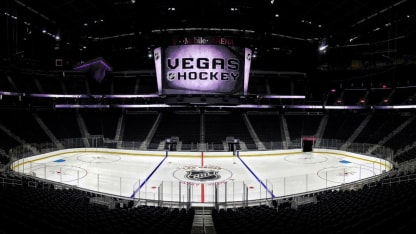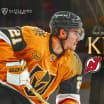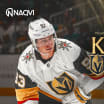How NHL Teams Got Their Names
A look at how all the other 30 NHL Teams got their Names

Also, what with the logo be, what will the uniforms look like and what colors will the team wear?
RELATED: Get tickets to see the Golden Knights
Now that we know our team will be named on November 22, have you ever wondered how the NHL's other 30 eams received their names?
We bet you didn't know that there are two teams whose name are drawn from World War I, two from the Civil War and another from the nickname of a 1920s bootlegger.
But alas, many NHL teams have names where there's more than meets the eye.
Anaheim Ducks: Founded in 1993, the then-called Mighty Ducks of Anaheim were directly named forThe Mighty Ducks movies. And until 2005, the NHL team and the movie Mighty Ducks shared a logo and colors, too. When Disney, which produced the movies and owned the NHL team, sold the team in 2005, the name was shortened to "Anaheim Ducks." Orange, which has become one of the team's primary colors, is in reference to Orange County, where Anaheim is located.
Arizona Coyotes:There was a team naming contest, with "Coyotes" beating out "Scorpions" amongst the finalists. Both Coyotes and Scorpions are inhabitants of the Arizona desert, and they wanted the team name to be an animal that was representative of the region.
Boston Bruins: Their name doesn't have a clever origin - the original general manager, Art Ross, picked a name, himself, back in 1924. A Bruin is a ferocious animal and alliterative with Boston, so that was what Ross went with. As inconsequential as that sounds, the Bruins' black and gold color scheme does have an interesting backstory that dates back to their original owner, a supermarket chain owner named Charles Adams. Black and gold were the colors of Adams' supermarket chain, which made his hockey team's uniforms an opportune canvas to advertise on.
Buffalo Sabres: Founded in 1970, the Buffalo Sabres were named by a team-naming contest. "Sabres" won, despite not having any direct connection to Buffalo.
Watch: Youtube Video
Calgary Flames: Flames have nothing to do with Calgary. The name comes from the Atlanta Flames, which joined the NHL in 1972 before relocating to Calgary in 1980. Atlanta Flames was a Civil War reference to General Sherman's March to the Sea, during which much of the state of Georgia was set ablaze. The Calgary Flames, which kept the Atlanta Flames name, are the only NHL team whose name references another country's Civil War.
Carolina Hurricanes:When the Hartford Whalers moved to North Carolina in 1997, there was no team naming contest. Peter Karmanos Jr., the team owner, chose "Hurricanes" because of the many hurricanes that strike the North Carolina coast.
Chicago Blackhawks: Like Las Vegas's Bill Foley, the Blackhawks' original owner, Major Frederic McLaughlin, was a military man. During World War I, the 86th Infantry Division, which McLaughlin was a member of, was referred to as the "Black Hawk division." To honor his division, as well as a Chicago restaurant he had opened with the same name (some extra advertising never hurt anyone), McLaughlin named his team the Black Hawks in 1926. This was shortened into a one-word team name, "Blackhawks," in the 1980s.
Colorado Avalanche: When the Quebec Nordiques moved to Denver in 1995, they needed a new name - Colorado Nordiques just didn't make any sense. They almost chose Wranglers, a few years before the Las Vegas Wranglers joined the ECHL, but settled on "Avalanche." There are often avalanches in the Rocky Mountains.
Columbus Blue Jackets: Before Columbus joined the NHL before the 2000-01 season, a team naming contest with over 14,000 entries was held. "Blue Jackets" was ultimately settled on due to Ohio's Civil War lineage - Ohio contributed more residents to the Union Army than any other state. Blue Jackets, based on the color jackets that Union soldiers wore, was a direct reference to this.
Watch: Youtube Video
Dallas Stars: From 1967-93, this franchise was known as the Minnesota North Stars. When the team moved to Texas in 1993, they simply dropped the "north," which fit perfectly because of Texas' status as the Lone Star State.
Detroit Red Wings: Originally called both the Detroit Falcons and Detroit Cougars, Detroit's NHL team was rebranded as the Red Wings in 1932. James Norris, who purchased the team, wanted to pay homage to an amateur club he played for in the 1890s called the Montreal Amateur Athletic Association, whose nickname was the Winged Wheelers. Red Wings is a derivative of the Winged Wheelers, who never played in the NHL, but won the first-ever Stanley Cup in 1893.
Edmonton Oilers: There are a lot of oil fields in northern Alberta. Calling Edmonton's team anything other than the Oilers just wouldn't fit the region.
Florida Panthers: When Florida joined the NHL in 1993, owner (and Blockbuster Video magnate) Wayne Huizenga wanted to raise awareness to the species of Florida Panthers, which at the time was endangered. Twenty-three years later, Florida Panthers are still endangered, although the hockey team is thriving with a division championship in 2015-16.
Los Angeles Kings: A team naming contest was held, but team owner Jack Kent Cooke ultimately wanted his team to take on an air of royalty. So "Kings" was an obvious choice. To boot, Cooke also owned the NBA's Los Angeles Lakers and wanted his teams to share colors, so Kings also fit the purple and yellow color scheme.
Minnesota Wild: After a team naming contest, Minnesota settled on "Wild," referring to the masses of woodlands and wildlife in the state of Minnesota. This was much to the chagrin of Paul Bunyan, after "Blue Ox" was edged by "Wild" amongst the finalists.
Montreal Canadiens: Named in 1909, the Canadiens are the only team name that predates the NHL's founding in 1917. At the time, Montreal had many teams, often representing various neighborhoods within the city. The Irish neighborhood's team was the Shamrocks, the English (loyal to England) neighborhood housed the Victorias. When the French area of the city got its own team, they went with "Canadiens," with an emphasis on the French spelling with an "e" instead of an "a." Due to their immense on-ice success, the Canadiens were the only Montreal team to last past the 1930s.
Nashville Predators: In the early 1970s, the fossil of a sabretooth tiger was found beneath a building in downtown Nashville. When the Predators joined the league in 1997, they already had chosen a logo to honor the fossil, but didn't have a team name. With the logo already decided, Nashville turned to a fan vote, with "Predators" being chosen over "Fury," "Attack" and "Ice Tigers."
New Jersey Devils: When the Colorado Rockies (hockey, not baseball) moved to New Jersey in 1982, the team owners instituted a team-naming contest. "Devils" was chosen as a nod to The Legend of the Jersey Devil, a local urban legend dating back centuries in which an actual supernatural devil roams the desolate Pine Barrens of southern New Jersey, looking for victims to bedevil.
New York Islanders: When Long Island got an NHL team in 1972, they wanted to establish that they were Long Island's team, and not just another New York City team. What better way is there to do that than call yourself the Islanders? The team was nearly named the Long Island Ducks after a local minor league team, which would've negated the Anaheim Ducks name from ever existing.
New York Rangers: The year before the Rangers were founded in 1926, a Prohibition-era bootlegger named George "Tex" Rickard purchased a Canadian team called the Hamilton Tigers and moved it to Madison Square Garden in New York. Rickard renamed the NHL's Tigers as the New York Americans, who'd later disband during World War II. Hockey was such a hit in New York in its first year that Rickard wanted to add a second team a year later. Because the new team was purely his team (and not one purchased from another owner), he came up with "Rangers," as in Tex's Rangers.
Watch: Youtube Video
Ottawa Senators: In hockey's early days, there was a team called the Ottawa Senators that won 11 Stanley Cups before relocating to St. Louis and going out of business during The Great Depression. When Ottawa finally got another team in 1991, they chose to honor the city's championship heritage. Besides, Ottawa is Canada's capital, so "Senators" is a very logical choice.
Philadelphia Flyers: Before the Flyers joined the NHL in 1967, they held a team naming contest. The winning submission, "Flyers," was chosen by team owner Ed Snider's sister. A "Flyer" isn't actually a specific thing as much as the name was meant to embody the fast-moving, high-speed action of NHL hockey. For whatever it's worth, Philadelphia had an earlier NHL team in the 1930s that was called the Quakers, owned by pro boxer Benny Leonard.
Pittsburgh Penguins: "Penguins" was selected by the original owner's wife. Going into the naming, it was already decided that they wanted the name to start with a "P," to roll off the tongue when placed next to Pittsburgh. The team's arena (built a decade before) had a giant, white, spherical roof and was nicknamed "The Igloo." What made more sense than to have the Penguins play in The Igloo?
San Jose Sharks: A team naming contest was held, with "Blades" being selected as the winner. It was decided, however, the Blades had an implied association with gang violence, so the name was scrapped. "Sharks" was chosen as a replacement due to the large volume of sharks that swim off the coast of Northern California.
St. Louis Blues: The only NHL team named after a song. W.C. Handy composed the song "St. Louis Blues" in 1914, so when the team joined the NHL in 1967, referring to the franchise as the "St. Louis Blues" was a natural way for the team and city to be intertwined.
Tampa Bay Lightning: Did you know that the Tampa Bay area has more lightning strikes than anywhere in the country? Well, it does.
Toronto Maple Leafs: This franchise had several names in its early years, existing as the Toronto St. Patricks throughout most of the 1920s after joining the NHL as the Toronto Arenas in 1917. When Conn Smythe, the man who the league's current playoff MVP trophy is named, bought the team in the late 1920s, he wanted a patriotic name to unite the city. Smythe fought in the Maple Leaf regiment in World War I, so chose a team name to match. Interestingly enough, the maple leaf wasn't even a part of the Canadian flag until the mid-1960s, so the "Toronto Maple Leafs" team name actually predates the maple leaf's presence on the national flag. And even more interestingly, many of the funds Smythe acquired to buy the team and build its new arena were won by wagering on horse races.
Vancouver Canucks: Before Vancouver joined the NHL in 1970, there had been a long-running minor league team in the city called the Vancouver Canucks. Canucks was a derivative of Johnny Canuck, an Uncle Sam-like character that's long been part of Canadian folklore.
Washington Capitals: Washington DC, obviously, is the capital of the United States. And the perfect name for Washington DC's team, which joined the NHL in 1974.
Winnipeg Jets: When the Atlanta Thrashers relocated to Winnipeg in 2011, they took on the name "Jets," after the NHL team that played in Winnipeg from 1979-96. The original Winnipeg Jets moved to Arizona in 1996 and became the Coyotes. The original Winnipeg Jets were given their name by their owner, Ben Hatskin, who was reportedly a huge NFL New York Jets fan. The Jets first took the ice in 1972, right about the time that Joe Namath's Jets were one of football's hottest commodities. Likewise, Winnipeg serves as a primary hub for the Royal Canadian Air Force.


















